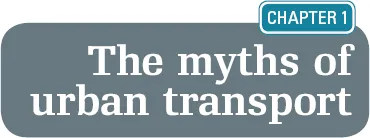![]()
Transport is part of the identity of every country, every town and city. How people travel tells you much about who they are, just as their buildings, their history and their politics do. And like all of these things, transport generates stories, which people tell to explain why things are as they are, or why they are not as people would like them to be. Some stories are told among transport specialists and others are told more widely, in the media, in politics and by ordinary people. Some stories contain important elements of the truth and others are more like urban myths, spread because they suit a prejudice, a legitimate desire or a vested interest. Several years of listening to these myths persuaded me to write this book.
To work out whether any of these myths have influenced you, here are a few questions drawn from the chapters in the first part of this book. If you don’t already know the answers, take a guess:
1. What happened to the UK duty on petrol between 2000 and 2012?
2. What happened to the total UK tax on petrol (including VAT) over the same period?
3. What percentage of households in Britain have a car?
4. What percentage of international flights from UK airports are for business purposes?
5. What percentage of Manchester’s commuters travel by tram?
6. Do Germans own more or fewer cars than Britons?
7. Do Germans drive more or less than Britons?
8. What percentage of journeys are for commuting in Britain?
9. What percentage of households are families with a couple and one or more children?
10. What percentage of dwellings in England are flats?
Answers |
Chapter |
1. Petrol duty fell by 16 per cent after allowing for inflation between 2000 and 2012 |
3 |
2. The total tax on petrol fell by 5 per cent between 2000 and 2012, allowing for inflation |
3 |
3. 75 per cent of households in Britain have one or more cars |
3 |
4. 19 per cent of international flights from UK airports are for business purposes |
4 |
5. 1.4 per cent of Manchester’s commuters travel by tram1 |
5 |
6. Germans own more cars than Britons |
6 |
7. They also drive more than Britons |
6 |
8. 16 per cent of trips are for commuting |
9 |
9. 19 per cent of households in England and Wales are families with a couple and one or more children |
9 |
10. 20 per cent of dwellings in England are flats |
9 |
If any of the answers surprised you, if you overestimated any of the numbers or thought Germans drove less than Britons, you have probably heard or read something influenced by these myths, and this book is especially for you. And if you are wondering why a book on transport is asking about families and flats, read on.
Chapters 3 to 9 in Part I begin with a list of myths commonly heard in the transport world, followed by ‘observations’, which cast doubt on some of them. I chose ‘observations’ rather than ‘the facts’ or ‘the truth’ because the truth is rarely straightforward and ‘facts’ may be interpreted in different ways. Most of the myths, like most issues in transport, involve numbers. People in the transport world like numbers: they suggest a degree of precision – hard facts instead of woolly opinions. Some of these people, including many politicians and transport economists, go further, falling for the ‘calculation fallacy’.
The calculation fallacy
The belief that a calculation can demonstrate what ought to be done, with no need for value judgments.
A calculation may help to estimate the consequences of an action but the level of desirability we attach to those consequences will always depend on value judgments. Some relatively simple value judgments on technical questions may seem fairly obvious. For example, if an engineering study shows that a bridge needs reinforcement to avoid a significant risk of failure, reasonable people would all agree that it must be reinforced if it is to remain open. But how much money should be spent on strengthening bridges against the risk of freak floods? Should the bridge or the road leading to it have been built in the first place? These questions can be informed but never answered by a calculation. People – including the economists at the Department for Transport (DfT) – who pretend that a calculation can show the right or the wrong decision are often trying to disguise the value judgments behind their calculations – values which might shock many people if they knew how the system worked. Chapter 4 will look at some specific examples of this.
This book does not pretend to be value free. My starting point is a belief that maintaining the conditions for life on Earth is more important than increasing consumption or maximizing individual freedom. At a more immediate level, I have observed how life in many European cities has improved as motor traffic has been removed from streets and neighbourhoods. If you support those aspirations, you will find useful evidence in this book, but whatever your own starting point, the analysis should interest and may surprise you.
![]()
![]()
Transport and climate change
The phrase ‘conditions for life on Earth’, in the previous chapter, may sound over-dramatic, but those conditions are facing growing threats: from loss of biodiversity to resource depletion and particularly climate change.2 With the possible exception of celebrity private lives, nothing has generated so much rubbish in the media and online as the science of climate change. Some of this rubbish has unfortunately found its way into Local Transport Today, the otherwise indispensable magazine for anyone who works in transport. For a readable summary, written by scientists who know what they are talking about (unlike most of the journalists, columnists and website authors you might have read), I particularly recommend Climate change: A summary of th...



